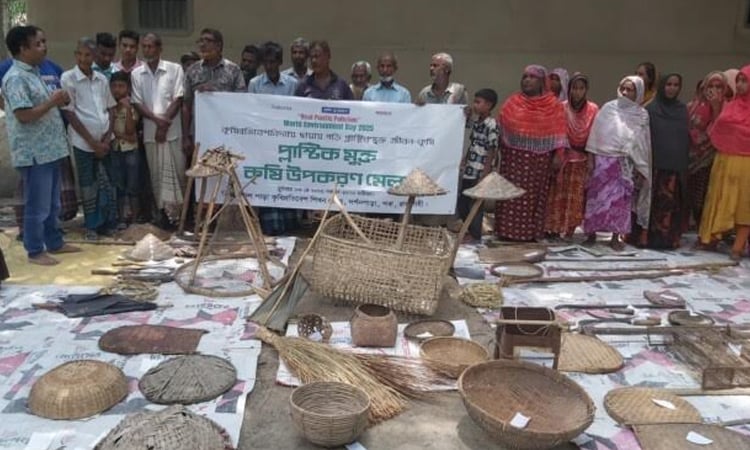
By Md Aynal Haque
RAJSHAHI, June 10, 2025 (BSS) - Plastic-free agriculture can be a crucial means of boosting farming production, as plastic has been posing a serious threat to the entire agricultural system in the region, particularly in the Barind area, for the last 12 to 15 years.
The Barind region, consisting of Rajshahi, Naogaon and Chapainawabganj districts, is ecologically diverse, yet environmentally critical and vulnerable. It faces challenges related to water scarcity and the adverse impacts of climate change, which are making agriculture, as well as the living and livelihood conditions of the people, increasingly difficult.
The widespread adoption of plastic-dependent agricultural practices has significantly degraded soil fertility, disrupted water systems, and negatively affected the natural balance of the environment.
Conventionally, farmers use plastic in various farming activities-particularly plastic mulching sheets for crops, plastic bags for fruits, plastic irrigation pipes, and plastic packaging for seeds and pesticides-either consciously or unconsciously.
Plastic is not only an environmental threat but also destructive to indigenous agricultural knowledge, local culture and traditional health practices.
Professor Chowdhury Sarwar Jahan of the Department of Geology and Mining at Rajshahi University (RU) said climate change is altering the nature of droughts in the Barind tract by raising temperatures and increasing rainfall variability, posing serious threats to people's lives and livelihoods.
He noted that the water-stressed region is among the worst-hit by droughts, with the number of consecutive dry days and average temperatures steadily increasing over the past 30 years. Drought episodes have become more erratic due to climate change-a trend likely to worsen in the coming decades.
He added that droughts create severe challenges for wildlife and vulnerable communities.
Some of the local farming communities have embarked on a new journey toward plastic-free agriculture and sustainable living. This shift is not merely a technological change but represents a deeper cultural and ethnographic transformation.
A significant transformation has been witnessed in eight villages of Tanore and Paba upazilas in Rajshahi and Nachole upazila in Chapainawabganj district during the period of 2023 to 2025. The villages are Gokul, Mathura, Mondumala Mahali Para, Dubail, Sindukai, Haridevpur, Bilnepal Para, and Kharibona.
Both men and women farmers are exchanging knowledge and experiences to establish agro-ecological best practices and processes through maintaining plastic-free lifestyles. Farmers have returned to using composted liquid fertilizers and natural pesticides made from red chili and neem leaves. Instead of plastic, they use clay pots, earthen jars, and bamboo containers for storage and application.
Sultana Khatun, a farmer from Darshanpara village in Paba Upazila, has been practicing agro-ecology and helping others adopt these methods for the last five years.
She said, "We can live without plastic, as plastic is endangering our lives, nature, and agriculture."
Through their efforts, they aim to send a strong message to society to ensure plastic-free agriculture. She has set up an agro-ecological learning center (ALC) at her home, producing natural bio-pesticides in clay containers and encouraging others to do the same.
Khatun has also contributed to the development of 20 model shotobari households, each capable of meeting their own food and seed needs through nature-based farming.
Another grassroots farmer, also named Sultana Khatun, from Bilnepal Para village in the same upazila, has established seed banks of indigenous crops and vegetables in her home.
She said three varieties of potatoes had disappeared from their area. "We collected those from Nachole and have now successfully reintroduced all of them," she added while speaking to BSS.
Expressing his gratitude to the seed bank, Raihan Kabir Ranju, another marginalized farmer from Nachole village, said drought-tolerant varieties are increasing thanks to the seed bank.
"We are conserving all indigenous seeds in our homemade bags, totally leaving behind the use of plastic," said Ranju.
Each of the seed banks has provided seeds to an average of 4,500 farmers over the last three years. The use of native seeds has increased, and previously lost varieties have been revived.
In addition, a seed library was established at the nearby Talanda Ananda Mohan High School in 2019. Students and teachers exchange indigenous seeds, grow vegetables at home without chemicals, and have banned plastic from the library's operations.
Kabuljan Begum of Haridevpur village said they keep seeds using traditional methods, not plastic. "Plastic harms us. We won't harm ourselves or let others do so further," she added.
The Bangladesh Resource Center for Indigenous Knowledge (BARCIK), a research-based organization, has been providing technical support to the farmers to promote plastic-free agricultural methods.
BARCIK Regional Coordinator Shahidul Islam said they have so far supported the development of 201 shotobari models and eight ALCs in the region.
Professor Redwanur Rahman of the Institute of Environmental Sciences at RU said the plastic-free agriculture and lifestyle movement in the Barind region is not just an environmental innovation but an ethnographic awakening.
He explained that it redefines how people relate to land, life, and society. The movement teaches the community that true development does not lie in external solutions but in reactivating internal knowledge, culture, and practices.
Professor Mijanur Rahman of the Department of Geography and Environmental Sciences at RU advocated for the collective efforts of the state, society, and citizens to ensure a plastic-free life, nature, and agriculture.